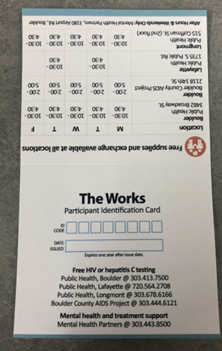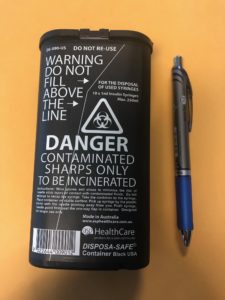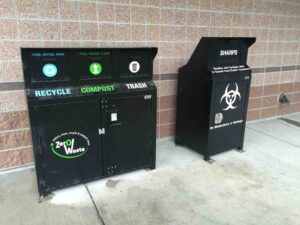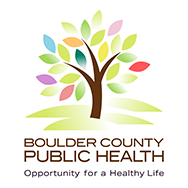Legality of Harm Reduction
Having started in 1989, Boulder County Public Health’s Works Program is the third-oldest syringe access program in the country
BCPH’s syringe service and harm reduction program prevent overdose deaths, infectious diseases (such as HIV and viral hepatitis/HCV), and increase safe syringe disposal. Many syringe service programs exist throughout the United States. These programs have been extensively studied and proven to save lives and support the health of local communities.
Harm Reduction Laws
Harm reduction programs are supported via various state and local laws. Participants in our programs are issued a card to acknowledge their participation. You may come across these – participants should keep these cards for future identification in the program and they should not be taken from participants during searches.
Sample Participant Card

The laws protect people in our program from anti-paraphernalia laws (not possession laws, only paraphernalia laws).
The laws also protect people who are with someone who is overdosing and who provide overdose support. People who are present during an overdose and stay at the scene are immune from prosecution for possessing small quantities of illicit substances
Suppose someone claims to be in the program but doesn’t have their card (people’s belongings are often stolen, particularly among the unhoused). In that case, the Works Program can write a letter confirming their participation in the program based on their participant code. Please reach out if you need this letter. It could save a lot of resources – we usually provide this to defense lawyers, but it could be helpful to have it earlier.
State Statutes
Senate Bill 10-189 (approved May 26, 2010) authorized the creation of sterile syringe exchange programs. This bill and the Colorado Revised Statutes summarized below provide the foundation for and regulate syringe exchange services in Colorado. It is important to be familiar with these laws and to understand how the law pertains to syringe exchange. Below is a summary of the Colorado Revised Statutes (C.R.S.) that pertain to syringe exchange.
Syringe Exchange Programs C.R.S. 25-1-520
This law allows local jurisdictions to approve the operation of syringe exchange programs. The Works program obtained approval from the Boulder County Board of Health in 2012. Participants, volunteers and staff are exempt from the provisions of paraphernalia laws sections 18-18-425 to 18-18-430 when associated with an approved syringe exchange program created pursuant to this law .
Drug Paraphernalia Law Exemption C.R.S. 18-18-430.5
Syringe exchange program participants are exempt from drug paraphernalia laws 18-18-425 through 18-18-430.
911 Good Samaritan Law C.R.S. 18-1-711
The 911 Good Samaritan Law states that a person is immune from criminal prosecution for an offense if the person reports in good faith an emergency drug or alcohol overdose event to a law enforcement officer, to the 911 system or a medical provider.
This same immunity also applies to persons who remain at the scene of the event until a law enforcement officer or an emergency medical responder arrives, or to those who remain at the facilities of the medical provider until a law enforcement officer, an emergency medical responder, or a medical provider arrives. The immunity described above also extends to the person who suffered an emergency drug or alcohol overdose event.
Third-Party Naloxone C.R.S. 18-1-712
This law allows for a person other than a health care provider or a health care facility who acts in good faith to administer an opioid antagonist to another person whom the person believes to be suffering an opioid-related drug overdose. The individual who administers naloxone shall be immune from criminal prosecution for such an act.
Naloxone Standing Orders C.R.S. 12-36-117.7
Signed on 04/03/2015, this law concerns the ability to supply emergency drugs to treat individuals who may experience an opioid-related drug overdose event. The bill allows licensed prescribers and licensed dispensers to dispense an opioid antagonist, either pursuant to a direct prescription order or in accordance with standing orders and protocols.
Needle-stick Prevention C.R.S. 18-18-428.
Signed into law on 04/03/2015, creates an exception to arrest and filing charges for the crime of possession of drug paraphernalia if the person prior to being searched by a law enforcement officer informs the officer, that they have a needle, syringe or other sharp object on their person or in their vehicle or home that is subject to a search. The exception to arrest and filing charges also applies to the crime of possession of a controlled substance as it relates to any residual controlled substance that may be found in a used needle, syringe, or other sharp object.
Colorado Revised Statute §25-1-508
County or district boards of public health have the power to (a) provide environmental health services and assess fees to offset the cost of the services; and (b) approve a syringe exchange program by an agency. County and district boards of public health are not required to approve a proposed program.






